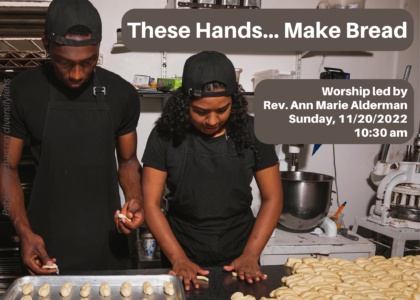Please visit our YouTube channel to watch Rev. Ann Marie’s video recording of this sermon.
My wife loves to make bread. She loves to cook, and she loves Thanksgiving. She always—each and every year we have been together—invited way too many friends and family over, to wherever we are living, for Thanksgiving. I think there are 18 coming this year. (We have a dining room table that seats eight!) As my mother and my grandmother did, and I suspect my great-grandmother, anybody and everybody is invited for Thanksgiving. I can remember 11 years of Thanksgiving meals with Robin by what bread she made and by what family and friends were with us crammed into wherever we were living at the time. The bigger the place, the more she people she has invited. So, I am not surprised this year that the numbers of invitees are way more than we have room for.
What is Thanksgiving about? Abundance and gratefulness.
When I was little, a pre-teen, a teen, in college years and beyond, Thanksgiving was always about eating too much. That kind of abundance. It wasn’t just about stuffing the turkey! I have a photo in my memory of me sitting in my grandmother’s wingback chair asleep. I know it is from Thanksgiving Day, because I look so full.
I am no longer sure that stuffing oneself is what Thanksgiving is for. I remember not only the tastes, but also the smells. Turkeys roasting, hams baking, pies cooling, and sweet potatoes and the marshmallows, sometimes duck? Always Asian food later or the next day, just to cleanse the palate.
For me and perhaps for you, what I think about and remember most are the hands that prepared for the meal. The hands of my mother and grandmother, my aunts, my wife…. The memories of their hands covered in bread dough, or stuffing. Their hands bringing it all to the table.
I remember some years ago when it became fashionable in UU circles to remember to thank all those who labored and took some part in preparing the food that was at our table, that was at all tables seemingly everywhere.
This month of November, we have been exploring the theme of remembrances. Thanksgiving, not unlike the other winter holidays, is a time for remembering those who surrounded us with the food they prepared, with the labor that brought the food, those who touched us in some way that was loving—that was their way of giving us life. Thanksgiving is about receiving the gift of life, of sustenance and fellowship.
Let us think about the hands that prepare, that give us life.
Look at your own hands. What do they tell you about what you have received? What …. might they say about what you have given?
Those of us who are sighted have photos and memories of the faces of those who have been dear to us. Do you remember their hands? Do you remember if they were cold or hot, or squishy, or strong? Do you remember if their veins were popping up? Do you remember if their fingers were straight or crooked? My mother’s thumb has always pointed toward the inside of her arm, having suffered a severed tendon when she was young.
When my dad died, the Sunday before Thanksgiving when I was 17, a senior in high school, a few days later there was an open casket visitation at the funeral home. I remember that I couldn’t look at his face for long, because it didn’t look like him. So, I chose to look at his hands. I will always remember his hands. I have watched my mother’s hands turn into my grandmother’s. Now I look at my own hands and see them both.
I look into your faces, but I also look at your hands. I see you preparing and serving. I see you reaching out, touching each other with tenderness. I see your hands forming, sustaining community.
Several congregations ago, I pastored another small group of people, always gathering to clean, to study, to eat, to sing, to show up for justice, to just be together. There was sometimes too much touching, sometimes not enough respect for each other. I helped them learn to greet each other with palms together, fingers touching: “Namaste.” That way no one could grab your hand, or you could put your elbows out to say you didn’t want to be hugged. But you were still honoring them and being honored.
Now that we have experienced a pandemic, we may still be keeping our distance, or going the other way and expressing our need for closeness. We may have been relieved at the end of too much touching. We may have missed touching.
Pay attention to what the other person’s hands are doing when you approach them. Pay attention to your own sense of touch.
Go gently. We can’t help but touch the babies, yet we might ask the parent first, “Is it okay?” We need touch. We need each other. We need hands. We need to remember not only people’s faces, but perhaps the smell of them, and also how do they feel. How do their hands feel? How did their hands feel? Pay attention to the remembrances of being held, literally (as my four-year-old is fond of saying) and figuratively. Pay attention to your hands, which prepare, which give life.
Hold one another in the ways you are comfortable doing so and say thank you this week. You may gather with friends and family, some who may annoy you, or irritate you, or you don’t want to get too close to. Say thank you anyway. Thanksgiving is about abundance and gratitude. Share your gratitude.
If you appreciated this reflection, please text to give or visit our Give Now page to support the UUCSH Share the Plate efforts to assist those in need.

